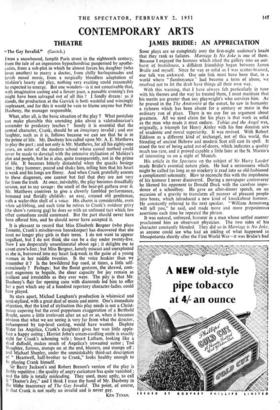CONTEMPORARY ARTS
THEATRE
'the Gay Invalid." (Garrick.) FROM a snowbound, lamplit Paris street in the eighteenth century, from the tale of an ingenuous hypochondriac pauperised by apothe- caries, from a sub-plot in which he almost forces his daughter (who loves another) to marry a doctor, from chilly harlequinades and lavish mood music, from a surgically bloodless adaptation of Moli4e's hearty old play, nothing very exciting could reasonably be expected to emerge. But one wonders—is it not conceivable that, with imaginative casting and a fiercer pace, a passable evening's fun might have been salvaged out of all this ? 1 fondly dream: as it stands, the production at the Garrick is both wasteful and wincingly unpleasant, and for this it would be vain to blame anyone but Peter Daubeny, the manager responsible.
What, after all, is the basic situation of the play ? What postulate can make plausible this unending joke about a valetudinarian's surrender to predatory leeches ? Surely it is essential that the central character, Crank, should be an imaginary invalid ; and our laughter, such as it is, follows because we can see that he is in the prime of life. Mr. Daubeny has called upon Mr. A. E. Matthews to play the part ; and not only is Mr. Matthews, for all his eighty-one years, an actor of the modern school whose casual method could never be made to dovetail with the intensive stylisation of Molierc's plot and people, but be is also, quite transparently, not in the prime of life. It becomes bitterly distasteful when the quacks besiege him ; they hammer, pound and shake him, telling him that his heart is weak and his lungs are flimsy. And when Crank gratefully assents to these diagnoses, one cannot but feel that they are not very far from the truth. At once, inevitably, the play becomes dreadfully serious, not to say savage: the smell of the bear-pit gathers over it. Mr. Matthews contrives to give a cleverly fumbled performance, bemused and floridly childish : an easy, creased old gentleman, with a wafer-thin shell of a voice. His charm is considerable, even when ad-libbing, and each time he retires to Crank's outdoor privy (the show's running gag) he does so with an unfussed tact which few other comedians could command. But the part should never have been offered him, and he should never have accepted it.
It is pleasant to record that Miss Elisabeth Bergner (who plays Toinette, Crank's mischievous housekeeper) has discovered that she must no longer play girls in their teens. I do not want to appear ungallant, but I do not think she can be a day under twenty-five. Now I am desperately unsentimental about age ; it delights me to count crow's-feet ; but Miss Bergner, lamely miscast and unexploitcd as she is, burrowed into my heart last,.week in the guise of a young woman in her middle twenties. Is the voice huskier than we remember it ? Is the bewildered lisp used, at times, a little self- consciously ? Perhaps: but the fluent gestures, the shrewd, com- pact eagerness to beguile, the sheer capacity for joy remain as resilient and irresistible as they ever were. The pity is that Mr. Daubeny's flair for opening cans with diamonds led him to offer her a part which any of a hundred repertory character-ladies could have played.
Its stars apart, Michael Langham's production is whimsical and semi-stylised, with a great deal of music and mime. One's immediate objection, that the kind of stylisation this play needs is not a Christ- massy capering but the cruel puppetoon exaggeration of a Berthold Brecht, seems a little irrelevant after an act or so, when it becomes obvious that what we arc seeing is very far from what the director, unhampered by top-level casting, would have wanted. Daphne Slater (as Angelica, Crank's daughter) gives her wan little apple- face a happy outing ; Harriet John's cream-curdling smile is exactly right for Crank's scheming wife ; Stuart Latham, looking like a dead daffodil, makes much of Angelica's unwanted suitor ; Tod Slaughter, furious, stumps on at the end, blusters, and stumps off ; and Michael Shepley, under the unmistakably third-act description Of " Hcartwell, half-brother to Crank," looks healthy enough to be playing Crank himself.
Sir Barry Jackson's and Robert Brenon's version of the play is feebly repetitive ; the quality of angry caricature has quite vanished ; and the title is totally misleading. They used, more aptly, to call It " Doctor's Joy," and I think I trace the hand of Mr. Daubeny in the blithe inaccuracy of The Gay Invalid. The point, of course, I, that Crank is not really an invalid and is never gay.
KEN TYNAN.


































 Previous page
Previous page